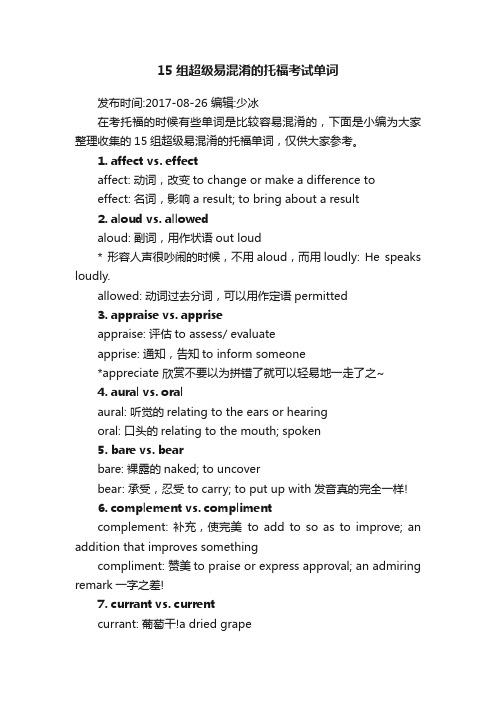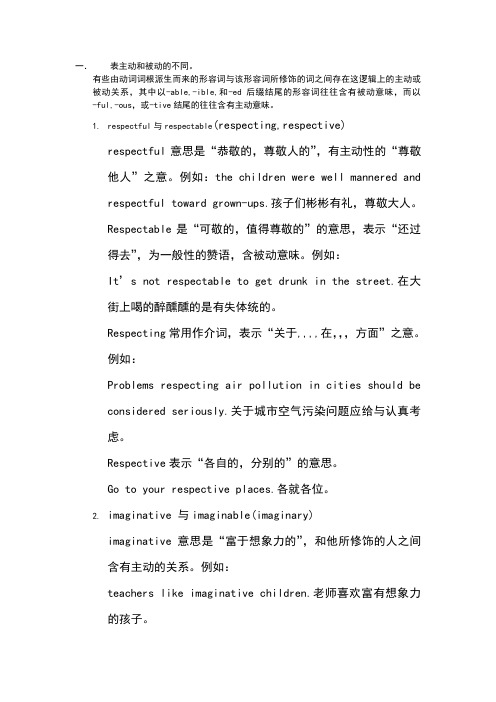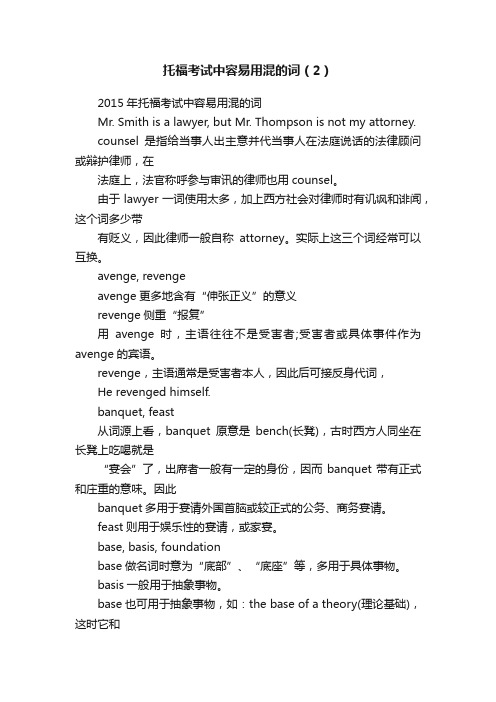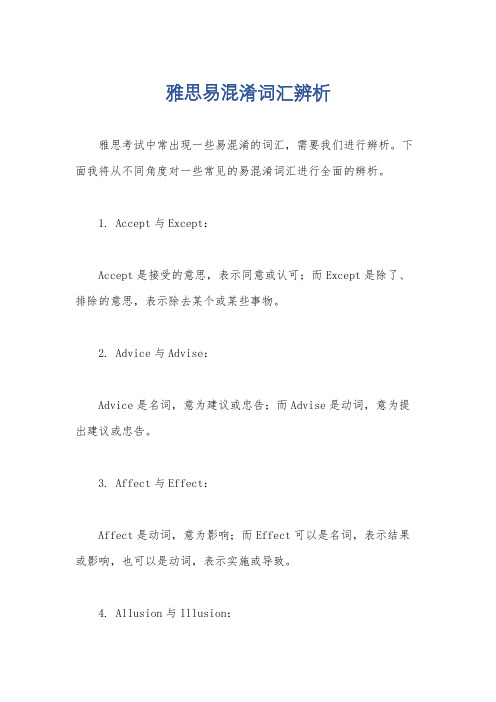托福写作容易混淆的形容词辨析
15组超级易混淆的托福考试单词

15组超级易混淆的托福考试单词发布时间:2017-08-26 编辑:少冰在考托福的时候有些单词是比较容易混淆的,下面是小编为大家整理收集的15组超级易混淆的托福单词,仅供大家参考。
1. affect vs. effectaffect: 动词,改变to change or make a difference toeffect: 名词,影响a result; to bring about a result2. aloud vs. allowedaloud: 副词,用作状语out loud* 形容人声很吵闹的时候,不用aloud,而用loudly: He speaks loudly.allowed: 动词过去分词,可以用作定语permitted3. appraise vs. appriseappraise: 评估to assess/ evaluateapprise: 通知,告知to inform someone*appreciate 欣赏不要以为拼错了就可以轻易地一走了之~4. aural vs. oralaural: 听觉的relating to the ears or hearingoral: 口头的relating to the mouth; spoken5. bare vs. bearbare: 裸露的naked; to uncoverbear: 承受,忍受to carry; to put up with发音真的完全一样!6. complement vs. complimentcomplement: 补充,使完美to add to so as to improve; an addition that improves somethingcompliment: 赞美to praise or express approval; an admiring remark一字之差!7. currant vs. currentcurrant: 葡萄干!a dried grapecurrent: 现行的,水流/气流/电流happening now; a flow of water, air, or electricity8. desert vs. dessertdesert: 荒漠,不毛之地a waterless, empty area; to abandon someonedessert: 甜品the sweet course of a meal写这个的时候,你是不是饿啦~9. disinterested vs. uninteresteddisinterested: 客观的,公正的impartialuninterested: 不感兴趣的not interested我就问你,中枪没?!10. ensure vs. insureensure: 确保to make certain that something will happeninsure: 投保to provide compensation if a person dies or property is damaged11. forbear vs. forebearforbear: 克制to refrainforebear: 祖先an ancestor记忆Tips1) for bear = 为了忍受(抖M在克制!)2) fore是“前面的”,比如forehead不就是前额嘛~bear是“生”,不然你以为born的动词原形怎么拼?所以forebear = 我们其面生的,那不就是祖先嘛!12. loose vs. loseloose: 松开,释放to unfasten; to set freelose: 失去,丢失to be deprived of; to be unable to find记忆Tips(我觉得我这个方法简直绝了!)loose把一个o给弄丢了,于是变成了lose13. pour vs. porepour: 倾倒to flow or cause to flowpore: 孔,钻研a tiny opening; to study something closely14. principal vs. principleprincipal: 最重要的,校长most important; the head of a schoolprinciple: 原则a fundamental rule or belief15. storey vs. storystorey: 台阶a level of a buildingstory: 故事a tale or account。
英语易混淆词汇辨析

一.表主动和被动的不同。
有些由动词词根派生而来的形容词与该形容词所修饰的词之间存在这逻辑上的主动或被动关系,其中以-able,-ible,和-ed后缀结尾的形容词往往含有被动意味,而以-ful,-ous,或-tive结尾的往往含有主动意味。
1.respectful与respectable(respecting,respective)respectful意思是“恭敬的,尊敬人的”,有主动性的“尊敬他人”之意。
例如:the children were well mannered and respectful toward grown-ups.孩子们彬彬有礼,尊敬大人。
Respectable是“可敬的,值得尊敬的”的意思,表示“还过得去”,为一般性的赞语,含被动意味。
例如:It’s not respectable to get drunk in the street.在大街上喝的醉醺醺的是有失体统的。
Respecting常用作介词,表示“关于,,,,在,,,方面”之意。
例如:Problems respecting air pollution in cities should be considered seriously.关于城市空气污染问题应给与认真考虑。
Respective表示“各自的,分别的”的意思。
Go to your respective places.各就各位。
2.imaginative 与imaginable(imaginary)imaginative 意思是“富于想象力的”,和他所修饰的人之间含有主动的关系。
例如:teachers like imaginative children.老师喜欢富有想象力的孩子。
Imaginable意思是“可想象的”,还有可以被想象出来的意思,即被动意味。
例如:This is the only solution imaginable.这是唯一可想象的解决办法。
40组托福最常考的易混淆词汇

40组托福最常考的易混淆词汇40组托福最常考的易混淆词汇1.abase & abash & abate & abuseabase v. 降低自己,贬抑,使卑下abash v. 使害羞,使尴尬abate v. 减轻,减少abuse v./n. 辱骂;滥用2.allay & alloyallay v. 减轻,缓和alloy n. 合金vt. 将…铸成合金,减低成色vi. 合铸3.blunt & blurtblunt a. 钝的;直率的;v. 变钝blurt v. 脱口而出4.bound & soundbound n. 跃,回跳,范围,边界vi. 跳跃,弹起vt. 使跳,限制,形成…的疆界7.chase & chasmchase v. 雕镂;追捕chasm n. 深渊,大沟;大差别;深沟;巨大差异,鸿沟8.cling & slingcling v. 紧抓住;舍不得放弃sling v. 投掷,扔;n. 吊腕带,吊索9.clout & floutclout n. 用手猛击;权力,影响力flout v. 蔑视,违抗10.creek & creepcreek n. 小湾,小溪creep v. 匍匐前进;悄悄地移动11.crest & wrestcrest n. 山顶,浪尖;(鸟)羽冠wrest n. 扭,拧vt. 夺取,猛扭,歪曲,费力取得12.daunt & haunt & taunt & vauntdaunt v. 使胆怯,使畏缩haunt v. 常去;鬼魂出没;(事情)萦绕心头;n. 常去的地方taunt n. 辱骂,嘲弄vt. 嘲弄,奚落a. 很高的vaunt vt. 自夸vi. 自夸n. 自吹自擂13.defer & deterdefer v. 推延;听从deter v. 威慑,吓住;阻止14.deign & feign & reigndeign v. 屈尊,惠允(做某事)feign v. 假装,伪装reign n. 统治时期;王朝;领域15.douse & rousedouse v. 把…浸入水中;熄灭;往…什么上浇水rouse n. 觉醒,奋起,干杯vt. 唤醒,鼓舞,激动,使振奋,惊起vi. 醒来,奋起16.elate & slateelate vt. 使兴高采烈,使得意slate n. 石板;候选人名单;v. 提名17.elude & exudeelude v. 逃避;不理解,记不住exude v. (液体)使慢慢流出;四溢18.exalt & exultexalt v.(高度)赞扬,歌颂extol exult v.欢腾,喜悦19.flush & plushflush n./v. 脸红;奔流;冲洗plush a. 豪华的20.forge & gorgeforge n. 铁匠铺;v. 锤炼;伪造gorge n. 峡谷。
专四常见易混词辨析

专业英语四级考试(TEM-4,Test for English Majors-Band 4)是中国大学英语专业本科生的英语水平测试之一,它要求考生掌握一定数量的词汇量,并能正确使用这些词汇。
在考试中,易混词的辨析是一个常见的题型,以下是一些常见的易混词及其辨析:1. affect/effect:-affect:动词,意为“影响”,通常指对人的情绪或行为产生影响。
-effect:名词,意为“效果”或“影响”,指事物产生的结果或后果。
2. advice/advise:- advice:名词,意为“建议”或“忠告”。
- advise:动词,意为“建议”或“劝告”。
3. agree/agreeable:- agree:动词,意为“同意”或“一致”。
- agreeable:形容词,意为“可接受的”或“令人愉快的”。
4. alive/alive:- alive:形容词,意为“活着的”或“活泼的”。
- alive:副词,意为“实际上”,用于强调陈述的真实性。
5. attend/attendance:- attend:动词,意为“参加”或“出席”。
- attendance:名词,意为“出席”或“出勤”。
6. beginning/begin:- beginning:名词,意为“开始”或“起点”。
- begin:动词,意为“开始”。
7. borne/born:-borne:过去分词,用作形容词,意为“忍受的”或“承担的”。
- born:过去分词,用作形容词,意为“出生的”或“天生的”。
8. except/accept:- except:介词,意为“除了”。
- accept:动词,意为“接受”或“同意”。
9. its/it's:- its:形容词性物主代词,意为“它的”。
- it's:缩写形式,是“It is”或“It has”的简写,意为“它是”或“它有”。
10. lose/loss:- lose:动词,意为“失去”或“丢失”。
托福考试中容易用混的词(2)

托福考试中容易用混的词(2)2015年托福考试中容易用混的词Mr. Smith is a lawyer, but Mr. Thompson is not my attorney.counsel是指给当事人出主意并代当事人在法庭说话的法律顾问或辩护律师,在法庭上,法官称呼参与审讯的律师也用counsel。
由于lawyer一词使用太多,加上西方社会对律师时有讥讽和诽闻,这个词多少带有贬义,因此律师一般自称attorney。
实际上这三个词经常可以互换。
avenge, revengeavenge更多地含有“伸张正义”的意义revenge侧重“报复”用avenge时,主语往往不是受害者;受害者或具体事件作为avenge的宾语。
revenge,主语通常是受害者本人,因此后可接反身代词,He revenged himself.banquet, feast从词源上看,banquet原意是bench(长凳),古时西方人同坐在长凳上吃喝就是“宴会”了,出席者一般有一定的身份,因而banquet带有正式和庄重的意味。
因此banquet多用于宴请外国首脑或较正式的公务、商务宴请。
feast则用于娱乐性的宴请,或家宴。
base, basis, foundationbase做名词时意为“底部”、“底座”等,多用于具体事物。
basis一般用于抽象事物。
base也可用于抽象事物,如:the base of a theory(理论基础),这时它和basis区别不大,然而basis在现代英语中用得越来越广泛。
尤以on a .. basis为甚:on a countract basis (合同制)foundation指具体事物时和base相似,但一般指高大建筑物的'基础;用于指抽象事物时与basis相似。
无论指哪一种,foundation 均给人以坚实和牢固的感觉。
bona fide, bona fidesbona fide: adv. adj. in good faithbona-fide enquiries 诚意的询问bona fides: n. good faithHis bona fides is beyond dou我是远方的一颗尘埃capital ,capitolcapital: the seat of government 首都、首府capitol: the buliding in which the government sits 政府大楼the Capitol --- 美国国会大厦chef , cookchef 来自法语,似乎身价更高一些,多指大酒楼的厨师cook 源于古英语,多指一般的厨师或炊事人员childish , childlikechildish 孩子气的,指孩子不如人意的地方,如不懂事、幼稚、傻气等,带有贬义childlike 孩子般的,多指孩子讨人喜欢的方面,如天真、纯洁、真诚等company , firm根据英美企业法,firm只是指partnership(合伙公司)或unincorporatedbusiness(非责任有限公司),company则可指corporation(责任有限公司)。
雅思易混淆词汇辨析

雅思易混淆词汇辨析雅思考试中常出现一些易混淆的词汇,需要我们进行辨析。
下面我将从不同角度对一些常见的易混淆词汇进行全面的辨析。
1. Accept与Except:Accept是接受的意思,表示同意或认可;而Except是除了、排除的意思,表示除去某个或某些事物。
2. Advice与Advise:Advice是名词,意为建议或忠告;而Advise是动词,意为提出建议或忠告。
3. Affect与Effect:Affect是动词,意为影响;而Effect可以是名词,表示结果或影响,也可以是动词,表示实施或导致。
4. Allusion与Illusion:Allusion是指暗示或间接提及;而Illusion是幻觉或错觉。
5. Capital与Capitol:Capital是首都或大写字母的意思;而Capitol是国会大厦。
6. Compliment与Complement:Compliment是赞美或恭维;而Complement是补充或补足。
7. Desert与Dessert:Desert是沙漠或离弃的意思;而Dessert是甜点。
8. Principle与Principal:Principle是原则或原理;而Principal可以是名词,表示校长或主要人物,也可以是形容词,表示主要的。
9. Stationary与Stationery:Stationary是静止的意思;而Stationery是文具。
10. Weather与Whether:Weather是天气;而Whether是是否。
以上是一些常见的易混淆词汇的辨析,希望对你有帮助。
记住它们的区别,可以在雅思考试中避免使用错误的词汇。
托福易混淆词汇盘点

托福易混淆词汇盘点大家在准备托福考试的时候常常会遇到容易混淆的词汇,接下来小编就帮大家把这些混淆词汇整理出来,让大家避免掉坑!那些年,让人傻傻分不清楚的托福词汇1、Disseminate/dissembleDisseminate的词根是semi=seed 种子,前缀dis=abroad 所以这个单词原义是传播种子(spread the seed away)词典解释:spread or disperse (something,especially information) widely: health authorities should foster good practice by disseminating information.传播扩散Dissembledissemble: conceal one's true motives, feelings, or beliefs: an honest, sincere person with no needto dissemble.disguise or conceal(a feeling or intention):she smiled, dissembling her true emotion.伪装/掩饰大家可以结合resemble(类似,相似)来记哦~2、Intelligible / intelligentIntelligible: able to be understood = comprehensible;Intelligent: = clever/brilliant/smart;3、Comprehensible /comprehensiveComprehensible:able to be understood = intelligible 能够被理解的Comprehensive: = inclusive/exhaustive 全面的4、Ignore / ignorant很多学生认为ignorant是ignore的形容词,自然而然理解为“忽略的,忽视的”其实ignorant 有两个不同的意思:(1)lacking knowledge or awareness in general; uneducatedor unsophisticated: 表示没有知识的,缺乏教育的,无知的,愚蠢的,含贬义;看词典例句: he was told constantly that he was ignorant and stupid.(2)Be ignorant of : without knowledgeof, unaware of, unconscious of, oblivious to 不熟悉,不知道,不了解5、Specious / specialSpecious: superficially plausible, but actually wrong: a specious argument ? misleading in appearance, especially misleadingly attractive: the music trade gives Golden Oldies a specious appearance of novelty.贬义,似是而非的,误导人的 = false/ spurious/ misleadingspecial: 独特的不同的6、Ingenious / ingenuous太容易混淆的单词!一定要区分开!看英文词典:Ingenious means ‘clever, skillful, resourceful’聪明ingenuous means ‘artless,frank’ (charmed by the ingenuous honesty of the child)。
英语中几组易混淆的形容词辩异

d y
一
.
t
h
y
g
p
a
id
5 0
b a d ly
。
s
词 常 指 事 或物 型里
。
通 常 用在
t
s C
… ta h
.t
二
的句
。
n u
d
r s
记a b l
e
卡车 司 机 又 罢 工 了 听 着 他
, 。
注意
:
th
5 1
a
la
a
u s e
里动词 用假设法
t
们 的 工 资待 遇 太 差 罢 工 是 可 理 解 的
ly 或 最
东西
。
im
l g
n a
l b
通 常 置 名词 后
3 fa
、
v o u r a
b le
与
“
,
it e
”
,
面
。
fa
“
v o :
王 r
a
b le
作 赞 成 的 解 时 后接 介 词
”
,
例
n
:
T h。 h
a
s
o
、 、S
e
: i。 a
w hiC h
s
w
g
o
p
a s s e
d
t
、
he
t
t
o
”
。
作 J 顷利 的 有 利 的 解 时 介 词 用
”
“
“
t
o
”
ig h t
g
e c
w
t
l
- 1、下载文档前请自行甄别文档内容的完整性,平台不提供额外的编辑、内容补充、找答案等附加服务。
- 2、"仅部分预览"的文档,不可在线预览部分如存在完整性等问题,可反馈申请退款(可完整预览的文档不适用该条件!)。
- 3、如文档侵犯您的权益,请联系客服反馈,我们会尽快为您处理(人工客服工作时间:9:00-18:30)。
Skill Builder 4: Adjective/Adverb Confusion
Directions: Write a “C” on the line if the sentence is correct. Write an “X” on the line if there is an adjective or adverb error.
3. Adverbs also modify adjectives.
ADV.
ADJ.
He grew an especially small tree.
ADV.
ADJ.
He was a highly motivated young man.
ADV.
ADJ.
It was a cleverly planned operation.
WRONG: He worked hardly at the factory all day. RIGHT: He worked hard at the factory all day.
WRONG: You should order that book real soon. RIGHT: You should order that book really soon.
hard
hard
(Do not add -ly to these words.)
c. The adverb for the adjective good is well.
1. Adjectives modify nouns (N) and pronouns.
ADJ.
N
ADJ.
N
His recent accident caused a sudden change in his behavior.
..........................................................................................
Chapter 3: Modifiers
35
.................................................................
WRONG: He is an extreme pleasant person. RIGHT: He is an extremely pleasant person.
WRONG: It was an interesting designed museum. RIGHT: It was an interestingly designed museum.
34
PART III: TOEFL Writing Review
.................................................................
..........................................................................................
WRONG: That loud music sounds badly to me. RIGHT: That loud music sounds bad to me.
WRONG: He looks handsomely in black. RIGHT: He looks handsome in black.
32
.................................................................
..........................................................................................
Skill Builder 5: Adjectives after Verbs of Sensation
Directions: Write a “C” on the line if the sentence is correct. Write an “X” on the line if there is an adjective or adverb error.
..........................................................................................
..........................................................................................
Error Examples
WRONG: Do it carefully, if not perfect. RIGHT: Do it carefully, if not perfectly.
VERB ADJ.
He feels bad.
VERB
ADJ.
The soup smells delicious.
VERB
ADJ.
She looked nervous before the test.
Error Examples
WRONG: Those flowers smell sweetly. RIGHT: Those flowers smell sweet.
NOUN ADJECTIVES
The first noun (N) in the following pattern is used as an adjective.
N
N
You are all language students.
a. When nouns are used as adjectives, they do not have plural or possessive forms.
ADJECTIVES AFTER VERBS OF SENSATION
The following verbs of sensation are generally followed by adjectives*, not by adverbs: feel, look, seem, appear, taste, smell, and sound.
b. EXCEPTIONS: The following nouns always end in -s but are singular in number when they are used as names of courses or sciences: physics, mathematics, economics.
1. The bus arrived lately, so I missed my first class. 2. We did not pass the test, but we certainly tried hard. 3. The train left at exactly 5:00 p.m. 4. When Ms. Smith went to Germany, she bought an exquisitely carved vase. 5. They had a real good chance of winning the national competition. 6. Computers process data efficiently. 7. We worked hard and saved enough money to take a trip. 8. There was a hasty called meeting to discuss the bus strike. 9. He was thorough interested in the subject. 10. That dress fits her perfectly. 11. She likes her students to arrive prompt for class. 12. We studied really hard for the test. 13. He was bright and attractive. 14. The child ran fastly to get to school. 15. He wrote his paper really good. 16. The careful organized tour of the city was a huge success. 17. You cannot possibly imagine how embarrassed I was yesterday. 18. Although he plays soccer well, he plays tennis bad. 19. I read an interestingly written report. 20. The time went by very fastly on our vacation.
ADJECTIVE/ADVERB CONFUSION
NOTE
a. Most adverbs end in -ly.
b. Some words have the same form for the adjective and adverb:
Adjective Adverb
late
late
fast
fast
NNLeabharlann He is an economics teacher.
BUT:
ADJ.
N
The current economic situation is extremely uncertain.
